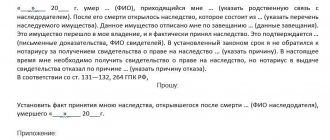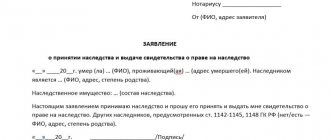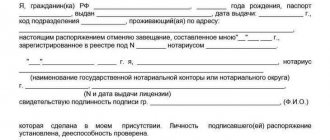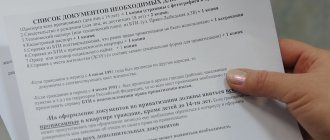18
To submit documents, heirs are given 6 months from the date of death of an individual. If you do not enter into an inheritance after six months, the recipient loses the right to claim the property of the deceased.
However, sometimes relatives do not know about the death of a person or are physically unable to visit the notary. In this case, it is possible to restore the terms through the court. Interested persons need to apply within 6 months after the end of the reason for absence.
Ways to restore a missed deadline
Let's consider what to do if the deadline for entering into an inheritance has been missed.
Established Art. 1154 of the Civil Code of the Russian Federation, the deadline for accepting an inheritance (if it is missed) can be restored through the court. This is done at the request of the heir who missed such a deadline. In this case, the court restores the deadline and recognizes the heir as accepting the inheritance.
This is only feasible if the person who applied to the judicial authority did not know and should not have known about the opening of the inheritance or missed this deadline for other valid reasons. Another condition: the heir who missed the deadline went to court within six months from the moment the reasons for missing such a deadline ceased to exist.
Restoring the period for entering into inheritance is also possible in another way. Thus, the inheritance is accepted by the heir after the expiration of the established period without going to court if there is written consent to this from all other heirs who have already accepted the inheritance.
If such written consent is given by the heirs not in the presence of a notary, their signatures on documents confirming consent must be certified in the manner specified in paragraph. 2 p. 1 art. 1153 of the Civil Code of the Russian Federation.
See also: What is the deadline for entering into inheritance in 2021 according to the law of the Russian Federation - detailed answer
What to do if the deadline for entering into inheritance by law has been missed
Entry into inheritance according to the law in accordance with Art. 1141 of the Civil Code of the Russian Federation is carried out in order of priority. The law establishes the procedure for a notary if the heir does not submit an application for inheritance in a timely manner.
In such situation:
- the property is divided among other heirs of this line;
- the property is transferred to the next heirs;
- in the absence of recipients, the property is transferred to the ownership of the state.
Inheritance by adopted children and adoptive parents according to Article 1147 of the Civil Code of the Russian Federation is similar to blood relatives.
With a will or without a will, is there a difference?
In a broad sense, it does not matter whether the period of inheritance by law or by will has been missed. The main consequence is the loss of rights to the property of the deceased.
If the deadline for the will is missed, then the right to the property of the testator passes to the heirs by law. If the inheritance period by law is missed, the rights are transferred to other first-priority recipients.
And if there are no heirs of this priority, the property is transferred to recipients of another priority.
The order of succession according to the law according to Art. 1142 – 1145 of the Civil Code of the Russian Federation is established from close relatives (husband, wife, children, parents) to nominal ones (stepfather, stepmother).
Ways to restore deadlines
Let's look at how to register an inheritance.
There are two ways to enter into inheritance rights when deadlines are missed:
- Go to court.
- Agree with relatives.
Important! Litigation is inevitable if the heirs do not want to go to the notary again. The claim is filed within 6 months after the end of the reasons for absence.
Valid reasons for absence
Reasons that did not depend on the will of the heir are considered valid.
Good Reason Options
| No. | Situation | Possible reasons |
| 1 | Lack of information | The recipient did not know the testator |
| The heir did not know about the death of the owner | ||
| The citizen did not know about the existence of a will | ||
| 2 | Legal insolvency | Recipient's incapacity |
| Recipient's limited legal capacity | ||
| Minor age | ||
| 3 | Health status | Long-term illness |
| Injury | ||
| Surgical treatment | ||
| 4 | Territorial separation | Business trip |
| Completion of military service | ||
| Living in another country |
What to do if there are no good reasons
The absence of the listed valid reasons is not a basis for the heir’s inaction. In some cases, the court may accommodate the potential recipient.
The law does not establish a list of valid reasons. Therefore, the issue is considered on an individual basis.
Important! The court will examine the circumstances of the case and make a decision based on the specific situation.
How to restore the term without going to court
To restore the term without resorting to the assistance of the court, there are two practical options. Of course, out-of-court procedures are much more profitable and convenient for the heir, since they significantly save time and material resources.
How is the term restored through the consent of the remaining heirs?
As stated earlier, it is possible to resolve the issue of restoring the missed deadline outside of court only with the written consent of the remaining heirs. If at least one of the heirs does not agree to this procedure, there is a dispute about the right. This means that the person who missed the deadline will have to defend his rights in court.
Procedure:
- Notify everyone who has already entered into the inheritance;
- Take steps to draw up written consent;
- Collect the documentation necessary to enter into an inheritance;
- Pay the state fee;
- Contact a notary;
- Return previously issued certificates of inheritance rights and obtain new ones;
- Register real estate.
The application is drawn up by the applicant himself or with the assistance of lawyers, including a notary. To formalize it, a voluntary expression of the will of the heirs from among those who accepted the inheritance is required.
Sample statement of consent to be included in the number of heirs (DOC, 13 KB)
As a general rule, applicants' signatures are certified by a notary. But the law also allows for certification of the authenticity of signatures in inheritance legal relations in another way.
Thus, signature certification is also carried out by an official authorized to perform notarial acts (clause 7 of Article 1125 of the Civil Code of the Russian Federation), or by a person authorized to certify powers of attorney in accordance with clause 3 of Art. 185.1 of the Civil Code of the Russian Federation.
If the heirs live in another locality, then they send their application with a certified signature by mail.
Attention! The method in question is not applicable if there is a single heir.
How to resolve the issue with deadlines using the actual acceptance of an inheritance
Another practical point concerns the actual acceptance of an inheritance within the period established by law without contacting a notary during the same period.
If the heir actually accepted the inheritance on time, that is, he performed any active actions indicating such acceptance: he used the testator’s things, took measures to preserve them, paid utilities for the testator’s housing, or simply lived in such housing as during the life of the testator so after his death, it is considered that he entered into the inheritance.
However, such an heir will still have to go to court to confirm a fact of legal significance and recognition of the right of ownership, since the notary will no longer issue him a certificate of right to inheritance in the general manner.
Procedure:
- Collection of evidence indicating acceptance of inheritance in fact,
- Applying to a notary with an application and evidence of acceptance of the inheritance,
- If you receive a refusal, file a claim with the court for actual acceptance of the inheritance and recognition of ownership rights.
To confirm the actual acceptance of the inheritance, one of the following documents or a combination of them is presented:
- Certificate of cohabitation with the testator,
- Tax payment receipts,
- Payment acts for payment of housing and utility bills,
- Testator's savings book,
- STS, PTS, car or other vehicle that belonged to the testator,
- Financial acts on money transfers, receipts for repayment of debts of the testator,
- Contract agreement for reconstruction, repair work, etc.
In this case, Art. 1153 of the Civil Code of the Russian Federation. However, citizens often go to court with mutually exclusive claims, stating their request: to simultaneously recognize the actual acceptance of the inheritance and restore the missed deadline for accepting the inheritance. Which is fundamentally wrong.
This fact is confirmed by the Review of judicial practice in inheritance cases of the Judicial Collegium for Civil Cases of the Rostov Regional Court dated December 6, 2016.
Is it possible to resolve the dispute peacefully?
When the distribution of property occurs among relatives of the same line, the restoration of the time frame for the heir can be significantly simplified. There is a mechanism for this, prescribed in Part 2 of Art. 1155 Civil Code of the Russian Federation . Its essence is as follows.
The remaining heirs have the right to express their consent to the restoration of the terms. Their general written expression of will is certified by a notary. And also, approval can be given by each of the relatives separately. All you need is a notarized signature on the document.
If there is agreement, the notary cancels the previous certificate of inheritance and issues a new one, but with a different distribution of shares. In a situation where the registration of rights has already occurred, it is abolished.
How to restore the term in court
In the absence of written consent of the remaining heirs to review the previously distributed inheritance shares, and also if there is only one heir, restoration of the missed deadline for entering into the inheritance is possible only in court. To do this, first of all, you need to submit a corresponding statement of claim and the documents attached to it.
If all the heirs missed the deadline, then they restore it in the same composition. Or those of them who decided to use the restorative procedure.
How to file a claim
A claim to restore the deadline for accepting an inheritance is filed with the district court at the place of residence of the defendants (one of them). The claim names the remaining heirs who entered into the inheritance in a timely manner as defendants. When inheriting escheated property, the Russian Federation or a municipal entity, a subject of the Russian Federation, is involved as defendants.
The main part of the statement of claim lists the reasons why the deadline was missed; references are provided to the documents available in the application confirming the described facts and circumstances. Among other things, the claim must be accompanied by documentation indicating that the reason for missing the deadline is valid and objective.
In the pleading part, the plaintiff asks to restore the missed deadline for accepting the inheritance and to recognize him as having accepted the inheritance.
Also, at the same time, in such a claim, under certain circumstances, the following claims are indicated:
- Recognize the certificate of the right to inheritance issued by a notary as invalid in whole or in part;
- Recognize the plaintiff's ownership of the inherited real estate;
- Request from a notary an inheritance document drawn up after the death of the testator.
The latter is required to facilitate the preparation of the case for consideration, since it is in the inheritance case that all the documents necessary for a civil case are available (applications for acceptance of inheritance, title documents for real estate, certificates with a technical description of residential buildings, etc.).
What to include in the application:
- Receipt for payment of state duty (original).
- Documents confirming the sending of copies of the claim to the participants in the process.
- Documents confirming the validity of the reason for missing the deadline: (in case of illness - certificates, sick leaves, epicrises, extracts from medical records; in case of long-term absence - travel sheets, air, railway tickets, vouchers, checks from hotels, certificates from places deprivation of liberty, court verdict, certificates and documentation of permanent residence outside the Russian Federation, etc.; in case of helplessness - certificates, reports from medical and social institutions; in case of illiteracy - a specialist’s opinion);
- Documents confirming other facts listed in the claim: rights of inheritance, death of the testator, availability of property of the testator.
Important! From November 2021, the plaintiff must first send copies of the statement of claim to the defendant and other participants in the civil process, and attach documents confirming this fact to the claim. See paragraph 6 of Art. 132 Code of Civil Procedure of the Russian Federation.
Sample statement of claim (DOC, 13)
Important! The period for applying to court to restore the term for accepting an inheritance is 6 months from the moment the circumstances preventing the heir from accepting the inheritance or learning about its opening have ceased.
How much state duty should I pay?
The state fee must be paid before filing the claim, since the original receipt is attached to it. The amount of the state duty paid depends on a number of circumstances, determined in accordance with the explanations contained in Letter of the Ministry of Finance of the Russian Federation N 03-05-06-03/79 dated June 11, 2010.
If, when filing a claim for recognition of the right to a share in inherited property (for the heirs to claim their share of the property), the dispute regarding recognition of the right of ownership of this property has not been previously resolved by the court, the state duty is paid in the manner established when filing claims of a property nature (p/p 1 clause 1 article 333.19 of the Tax Code of the Russian Federation).
Namely:
- Up to 20 thousand rubles — 4% of the claim price, but not less than 400 rubles;
- From 20 thousand 1 rub. up to 100 thousand rubles — 800 rub. + 3% of the amount over 20 thousand rubles;
- From 100 thousand 1 rub. up to 200 thousand rubles — 3 thousand 200 rub. + 2% of the amount over 100 thousand rubles;
- From 200 thousand 1 rub. up to 1 million rub. — 5 thousand 200 rub. + 1% of the amount over 200 thousand rubles;
- More than 1 million rubles. — 13 thousand 200 rub. + 0.5% of the amount over 1 million rubles, but not more than 60 thousand rubles.
If, when filing such a claim, a dispute regarding the recognition of ownership of this property was previously resolved by the court, the state duty is paid in the manner established when filing claims of a property nature that are not subject to assessment (clause 3, clause 1, article 333.19 of the Tax Code of the Russian Federation) . For individuals - 300 rubles.
What reasons for missing a deadline are considered valid?
Valid reasons for missing the deadline for accepting an inheritance include circumstances related to the personality of the plaintiff:
- Helplessness - due to old age, disability or other physiological or mental conditions;
- Serious illness (recovery from an accident, undergoing a major operation, rehabilitation period after receiving a serious injury, being in a coma and similar physiological conditions, as well as significant mental disorders that do not allow a person to complete paperwork);
- Incapacity (total or partial - due to age or deprivation of it by a court);
- Long-term stay outside the Russian Federation (business trip, travel, permanent residence);
- Long-term stay in remote, inaccessible areas (travel, scientific expedition, rotational work in mining);
- Being in prison when it is impossible to obtain information about the testator and perform legally significant actions;
- Illiteracy, etc.
There is an analogy here with Art. 205 of the Civil Code of the Russian Federation.
At the same time, even seemingly valid circumstances at first glance are not often recognized as such by the court.
Thus, the Supreme Court of the Russian Federation indicated that the stay of the heir in places of imprisonment during the opening of the inheritance does not yet indicate that such a person was deprived of the opportunity to learn about the death of the testator, and therefore about the fact of the opening of the inheritance. The Supreme Court of the Russian Federation adheres to a similar position regarding relatives who have not maintained contact with the testator for a long time.
The following are definitely not considered valid reasons:
- Ignorance of legal norms regarding the timing and methods of accepting an inheritance,
- Short-term health disorder
- Lack of information about the composition of inherited property, etc.
Another possible reason for reinstating the term, mentioned separately by the legislator, is the heir’s ignorance of the opening of the inheritance and the impossibility of such knowledge. The legal condition for application is the objectivity of the specified circumstances, that is, independence from the will of the person inheriting the property.
Attention! The corresponding explanations regarding the restoration of the deadlines for entering into inheritance are contained in the plenum of the Supreme Court of the Russian Federation (No. 9 of May 29, 2012) “On judicial practice in inheritance cases.”
What to do if there are no good reasons
If there are no valid reasons for missing the acceptance of the inheritance, it is necessary to try to collect evidence of the actual acceptance of the inheritance, including obtaining testimony. One of your relatives, acquaintances or neighbors has certainly seen you, at least once in six months since the death of the testator, with some things from the inherited property.
Important reasons for missing a deadline
If you missed the deadline for accepting an inheritance, it can be restored without going to court.
But the remaining legal successors must give written consent. In this case, the reasons for the omission are unimportant. With the court everything is more complicated. You will have to go there if other heirs are against reinstating the term for you. The court will consider the reasons why it was omitted.
Detailed explanations about the reasons are provided in the Resolution of the Plenum of the Supreme Court of the Russian Federation dated May 29, 2012 No. 9 “On judicial practice in cases...”. They are indicated in paragraph 40. For example, if you did not know and could not know about the death of the testator, or contact a notary in time for the following reasons:
- serious illness;
- ignorance of the death of the testator;
- illiteracy;
- helpless state;
- serving a sentence for a crime;
- compulsory military service.
That is, the circumstances must be inextricably linked with your personality and not depend on you.
If you knew about the death of the testator, but you did not have information about the inheritance or the notary who is handling the inheritance case, the court will not restore the missed deadline - these are not valid reasons.
Here are some practical examples:
No. 1. The man had two sons. One of them was serving a sentence in a correctional colony when his father died. His property included an apartment and a house with a plot of land. They went to the second son, who was at large. The one who was in the penal colony was released two years after his father’s death and learned about the inheritance. I tried to come to an agreement with my brother, but in vain: he refused to divide the property and re-register everything in a new way.
Then the former prisoner filed a lawsuit to restore the deadline for accepting the inheritance. In support of his demands, he indicated that on the day of his father’s death and the next two years he was serving a sentence, and could not submit documents to the notary on time. In addition, he did not know about the death of his parent, because... did not maintain communication with him.
No. 2. The woman became seriously ill with coronavirus. She spent two months in the hospital, another month in a rehabilitation center, then four months in a hospital home. She needed oxygen support and could not go long without a concentrator. While she was still in the hospital, her father died. She knew about this, but for objective reasons she was unable to submit documents to inherit the inheritance. Her sick leave was closed only 7 months after her father’s death.
Her sister received an inheritance in the form of a house with a plot of land. It was not possible to come to a peaceful agreement with her; she was against restoring the missed deadline for accepting the inheritance. Then the woman went to court, presenting an extract from the hospital and all sick leave certificates, thereby confirming that she could not come to the notary on time for a good reason.
Actual acceptance of inheritance
How to draw up a statement of claim to establish the fact of acceptance of an inheritance?
Is it possible to restore the term if you first refused the inheritance and then changed your mind?
If a citizen has submitted an application to a notary to renounce his share of the inheritance in favor of other heirs or without indicating specific persons, then it will no longer be possible to withdraw this application. The legislation of the Russian Federation does not provide for such a direct possibility.
In such a situation, only the rules of law on invalidating a unilateral transaction are applicable. That is, a citizen who has previously refused an inheritance has the right to challenge his refusal in court, if there are legal grounds for this. In particular, these are:
- Deception, misrepresentation, abuse of trust on the part of other heirs,
- Completing a transaction due to difficult life circumstances or under physical or psychological pressure.
What is actual acceptance of an inheritance and what actions does it involve?
When actually accepting the inheritance, the heir does not fulfill the formalities required by law for acquiring inheritance rights. At the same time, he performs certain actions that indicate the actual acceptance of the inheritance. For example:
- He has become the owner of the property or is using it for its intended purpose (in particular, he has moved into an apartment or started using a car).
- He took measures to ensure the safety of the testator’s property (installed a new door in the apartment, installed an alarm system, purchased a safe for funds).
- Maintains the testator's property at his own expense (paid utilities, transport or property taxes, made repairs in the apartment).
- Paid the testator's debts from his own funds (for example, made a loan payment for him).
These actions are prescribed in paragraph 2 of Art. 1153 of the Civil Code and do not limit the heir in choosing the method of actually entering into inheritance. At the same time, the legislation allows for other actions that indicate the heir’s readiness to enter into inheritance rights regarding the testator’s property.
In particular, the Resolution of the Plenum of the Supreme Council No. 9 of 2012 indicates the following examples of actual inheritance:
- Moving the heir into the apartment or house of the deceased and living together with him until his death (without taking into account his actual registration at the specified address).
- Cultivation of land.
- Appeal to the court regarding the property interests of the testator.
- Payment of various tax, utility and insurance payments for it.
- Payment of expenses associated with opening an inheritance (in particular, caring for the testator before his death; payment for his wake, burial, costs of protecting inherited property, storing things in a safe deposit box and various state duties).
In practice, the heir and the testator may own common property. This fact cannot be considered as actual acceptance of the inheritance. In any case, the heir needs to take additional actions: pay bills or move into an apartment, etc.
At the same time, receiving a funeral benefit, which is guaranteed by the state, is not included in the methods of accepting an inheritance (benefits under Article 10 of the Federal Law No. 8).
If the heir had no intention of entering into the inheritance, but he took actions to accept it (for example, continued to live in the testator’s living space after his death), then he should apply to the court with a statement not to accept the inherited property.
Will the term be restored if 6 months have passed from the day the heir learned about the inheritance?
If 6 months have passed from the moment when the reasons that prevented the heir from learning about the opening of the inheritance have disappeared, then he no longer has the right to go to court to restore the period. This rule is established by clause 40 of the RF Supreme Court Ruling “On judicial practice in inheritance cases.”
The Resolution of the Plenum of the Supreme Court directly states: restoration of the deadline is permissible if the heir who missed the deadline appeals to the court with a corresponding demand within six months after the reasons for missing the deadline no longer exist. The said deadline cannot be restored, and the heir who misses it is deprived of the right to restore the deadline for accepting the inheritance.
Do I need to contact a notary if there is a court decision?
If the heir went to court, then after receiving a court decision to restore the term, he will need to re-visit the notary and submit the relevant documents.
If the hearing of the case took place in the manner of claim proceedings, where the plaintiff made several demands, including a request for recognition of the right of ownership of property, then there is no need to contact a notary (clause 41 of the Resolution of the Plenum of the Armed Forces of the Russian Federation dated May 29, 2012 No. 9). Registration of ownership of property is carried out by court decision.
What can you do if the court refuses to restore the deadlines?
If we are not talking about missing the above deadline, then the plaintiff has the right to appeal the court’s refusal to restore the deadline for entering into inheritance in the appellate and cassation procedures.
An appeal is filed against a court decision that has not entered into force. Cassation - for something that has already entered into force. It should be borne in mind that if you want to achieve a positive result, you need real legal grounds for filing complaints. They are listed in Art. 330 Code of Civil Procedure of the Russian Federation and Art. 379.7 Code of Civil Procedure of the Russian Federation.
State duty
According to the provisions of article paragraphs. 3 p. 1 art. 333.19 of the Tax Code of the Russian Federation, the state duty when filing an application is 300 rubles.
If property interests are affected, the price of the claim is determined based on the assessment of the market value of the property. In this case, the state duty is determined in accordance with paragraphs. 1 clause 1 art. 333.19 Tax Code of the Russian Federation.
How much does it cost to enter into an inheritance with a notary?
What does judicial practice say?
Despite the apparent clarity of the algorithms for action in the event of missing deadlines for accepting an inheritance, law enforcement practice in this area of legal relations has many aspects. In particular, the Supreme Court of the Russian Federation has repeatedly given explanations to lower courts when it is impossible to restore the deadline for accepting an inheritance.
Thus, according to the Supreme Court of the Russian Federation, ignorance that an inheritance has opened cannot in itself serve as a basis for restoring the missed deadline. The highest court emphasized: the lack of information from the plaintiffs about the death of the testator is not one of the legally significant circumstances with which the law connects the possibility of restoring the term.
If the plaintiffs were not objectively deprived of the opportunity to maintain relations with the testator, to take an interest in his health and fate, then they have no right to apply for restoration of the missed period. Reluctance to maintain family relations with the testator, lack of interest in his life and fate are not classified either by law or by the plenums of the RF Armed Forces as valid reasons for missing the deadline for accepting an inheritance.
This circumstance is subjective in nature and can be overcome “subject to the will of the heirs.”
The heir's ignorance of the opening of the inheritance is applied by the court only in conjunction with the condition that he applied for restoration of the period within 6 months, starting from the moment when the circumstances preventing him from obtaining such information no longer existed.
In addition, the court must have reliable evidence of the fact that the plaintiff really did not know and did not have the opportunity to know about the death of the testator for objective reasons, and was deprived of real conditions for maintaining contact with him, obtaining information about his life and health.
Among the reasons recognized by the court as valid are the following:
- Residence of the heir abroad (decision No. 2-60/2019 of March 27, 2019 in case No. 2-60/2019);
- Ignorance of legal successors about the availability of an inherited funded part of the insurance pension from the testator (decision No. 2-1516/2019 2-185/2020 of 02/28/2020 in case No. 2-1516/2019);
- Inaction of the legal representative, which led to the missed deadline for contacting a notary, due to the impossibility of a minor to independently exercise the right to accept an inheritance within the established period due to his age (decision No. 2-1653/2019 2-202/2020 dated 02.28.2020 on case No. 2-1653/2019);
- Waiting for the court decision to declare the testator dead to enter into force (decision No. 2-1348/2020 of February 27, 2020 in case No. 2-4758/2019);
- Impossibility of timely application due to health status and old age (decision No. 2-476/2020 of February 27, 2020 in case No. 2-476/2020).
Good reasons
Their exhaustive list is not established by law. Some clues are contained in paragraph 40 of the Resolution of the Plenum of the Supreme Court No. 9 of May 29, 2012. There, in particular, it is stated that reasons related to the personality of the plaintiff should be considered valid. According to Art. 205 of the Civil Code of the Russian Federation, this includes serious illness or helpless condition. Illiteracy may also play a role.
In practice, objective circumstances include a long stay abroad or serving a sentence in prison. The courts also take into account the lack of long-term contact with the testator. This is especially common in situations with children from different marriages.
The aforementioned Resolution of the Plenum also contains reference to those reasons that, under any circumstances, cannot be considered valid. This category includes ignorance of laws and lack of information about objects of inheritance.
What to do after the terms are restored
When recognizing the heir as having accepted the inheritance, the court establishes the shares of all heirs in the inherited property and, if necessary, prescribes measures to protect the rights of the new heir to receive the inheritance share due to him (Clause 3 of Article 1155 of the Civil Code of the Russian Federation). The court recognizes the certificates of inheritance rights issued up to this point as invalid.
The duly executed consent of the heirs serves as the legal basis for the notary to cancel previously issued certificates of the right to inheritance and the basis for issuing new ones.
If, on the basis of a previously issued certificate, state registration of rights to real estate has already been carried out, the notary’s decision to cancel the previous certificate and the new certificate act as a legal condition for making the necessary changes to the state registration record.
The restoration of the period for entering into inheritance is also based on the actual acceptance of the inherited property.
An heir who accepted the inheritance after the expiration of the established period in compliance with the rules of Part 3 of the Civil Code of the Russian Federation has the right to receive the inheritance due to him in accordance with the rules of Articles 1104, 1105, 1107 and 1108 of the Civil Code of the Russian Federation, which in the case mentioned in paragraph 2 of Art. 1155 of the Civil Code of the Russian Federation, apply, since the concluded written agreement between the heirs does not provide otherwise.
In other words, we are talking about the unjust enrichment of the remaining heirs at the expense of the share of one of them who missed the legal deadline for entering into an inheritance, and about its legal consequences.
Deadlines for accepting an inheritance
The heirs must accept the inheritance within six months from the date of death of the testator (Article 1154 of the Civil Code of the Russian Federation). The expiration of the period for accepting an inheritance does not depend on the specifics of its receipt - it is the same for both inheritance by law and inheritance by will.
If you are late in entering into the inheritance, your share will be divided equally among the remaining legal successors. If you were the only heir of the first stage, the property passed to those in the second stage: full and half brothers and sisters, grandparents of the testator (Article 1143 of the Civil Code of the Russian Federation).
Another thing is inheritance by will. In this case, your share is distributed among the remaining legal successors indicated in it. If there are none, it is transferred to other heirs of the first priority: spouse, child, parents of the testator (Article 1142 of the Civil Code of the Russian Federation).
Crib
The above is shown schematically as follows. If the 6-month deadline for entering into an inheritance is missed, there are 3 options for further developments:
- Actual acceptance of the inheritance - in the event of actions taken indicating that the heir has in fact accepted the inheritance within the prescribed period. In this situation, the heir first turns to the notary with an application to issue a certificate of the right to inheritance. Written evidence of actual acceptance of the inheritance is attached to the application. If the notary refuses to issue such a certificate, the heir goes to court.
- Extrajudicial procedure - with the consent of the remaining heirs. Consent is provided in writing. Signatures are certified by a notary or other method established by law. This is followed by an appeal to a notary.
- Judicial procedure - in the case where there is only one heir or there is a dispute about the right if there are good reasons for missing a deadline. It is required to go to court with a statement of claim and attach evidence of valid reasons for missing the deadline for accepting the inheritance.
Why were you late in inheriting?
Lawyer's answers to questions about restoring the deadline for accepting an inheritance
I missed the deadline to contact a notary. I don’t have any valid reasons: I didn’t contact the notary’s office because I didn’t have time. Can I get my share of the inheritance?
Yes, if other heirs agree. If not, the court is unlikely to restore the term
All the heirs missed the deadline for entering into inheritance, what should we do?
If there are no successors of the third and subsequent stages who accepted the inheritance, file a claim in court. If they are, try to negotiate with them so that they agree
I accepted the inheritance after the fact and did not contact the notary's office. A year has passed, now I fully provide for the property, pay bills and receipts, and invest in repairs. Do I need to contact a notary?
It would be desirable. Otherwise, you will not be able to dispose of the property: rent it out, exchange it or sell it, or pass it on by inheritance. File a lawsuit to establish the actual acceptance of the inheritance
I am the heir of the first stage and missed the deadline for entering into inheritance. The heirs of the second stage entered into the inheritance and registered the property as their own. Can I restore the terms and will the property belong to me if the terms are restored?
If you can prove the validity of the grounds for the omission and restore the deadline, then the procedure for entering into inheritance rights will be carried out according to the general rules. The heirs of the second stage will lose the right to receive property, the court will oblige you to return all the property they received in full, and if it is impossible to actually return it, they undertake to return its market value.
I am the only heir and missed the deadline for entering into inheritance. Where should I contact?
It is necessary to go to court, but the defendant in such a case will not be the other heirs (since there are none), but the municipality, as the recipient of the escheated property.







